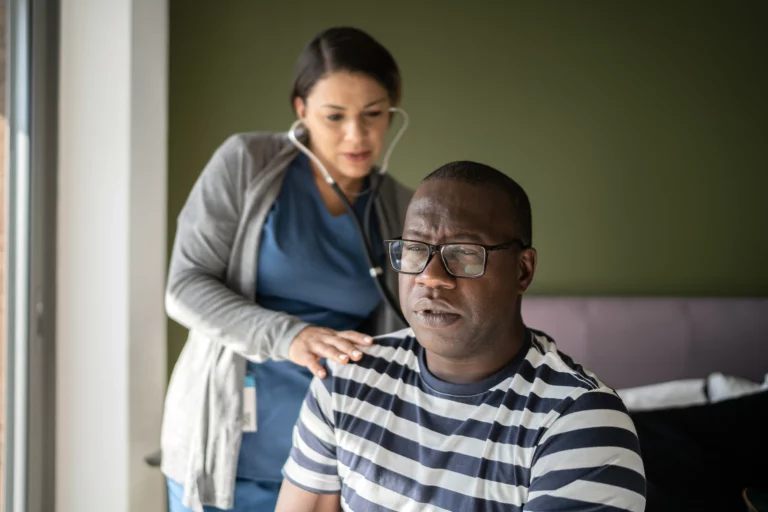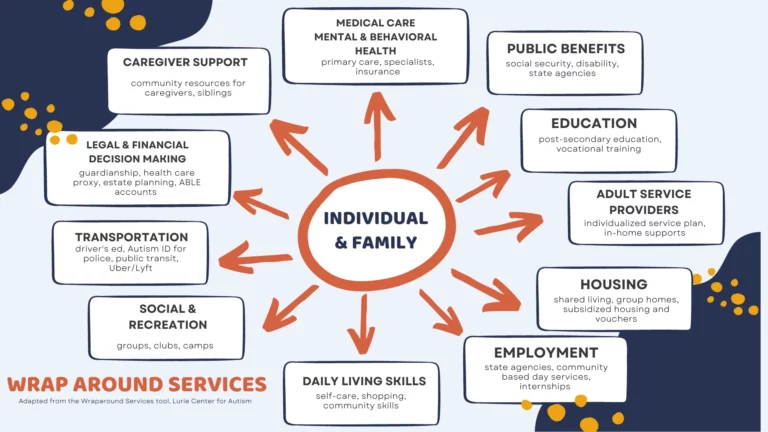Clear all filters
Caregiver Guidance

Types of Primary Care Providers
Primary Care Providers (PCPs) are often the first to diagnose and treat medical problems that affect adults. They also identify risk factors for disease and offer advice on prevention.
Primary care providers (PCP) provide health care on an as-needed and long-term basis for people in early adulthood through older age. PCPs are often the first to diagnose and treat medical problems that affect adults. They also identify risk factors for disease and offer advice on prevention. General services that primary care clinicians provide include:
perform age-appropriate periodic wellness assessments
prescribe medications
treat illnesses and injuries
screen for common health issues based on personal risk factors and family history
manage acute and chronic conditions
order diagnostic tests
make referrals to specialty clinicians when necessary
A PCP may be one of the following types:
Medical Doctors (MD) or Doctors of Osteopathy (DO) may also be called Internal Medicine Doctors.
Nurse Practitioners (NP) provide primary care independently or in conjunction with/under supervision of a physician (varies depending on state regulations).
Family Practice physicians can treat all age ranges within a family, asservices include pediatric and OB/GYN care.
Supporting health care professionals that provide care under the supervision of MD, DO, or NP:
Physician Assistants (PA) are licensed medical professionals that provide many of the same services as primary care physicians. PAs can examine, diagnose, and treat patients and are able to assist in minor procedures. PAs are also able to prescribe medications.
Nurses (RN, LPN, APRN) assist PCPs by delivering specified types of patient care and implementing treatment plans such as administering medications. Nurses are unable to prescribe medications.
Medical Assistant (MA) complete both administrative and clinical tasks in hospitals, physician offices, and other healthcare facilities. Their tasks can include taking medicals histories, preparing patients for examinations, and explaining procedures.
More information is available from the American Academy of Family Physicians.

Medical Specialists and What They Treat
Many autistic adults and caregivers are familiar with the type of medical care that specialists, such as neurologists and gastroenterologists, provide for co-occuring health conditions. We’ve compiled this list of specialists so that autistic adults are familiar with more types of clinicians that treat health issues that may arise across the lifespan.
Allergists or immunologists treat allergies, asthma, and immunologic disorders, including primary immunodeficiencies.
Anesthesiologists administer anesthetics and analgesics for pain management pre-, during, and post-surgical procedures.
Cardiologists treat conditions related to the cardiovascular system (heart and blood vessels).
Dermatologists treat conditions related to the skin, hair, and nails.
Endocrinologists treat hormone-related conditions.
Gastroenterologists treat conditions related to the digestive system.
Geriatric physicians/geriatricians treat medical and psychological conditions associated with aging.
Hematologists treat blood disorders, including leukemia.
Infectious disease specialists treat conditions related to infections that are contagious.
Nephrologists treat conditions related to kidney function.
Neurologists treat conditions affecting the nervous system (brain, nerves, and spine).
Medical geneticists diagnose and treat genetic (inherited) conditions.
Obstetrician/gynecologists (OB/GYNs) treat conditions related to female reproductive health, including pregnancy, childbirth, menstruation, and menopause.
Oncologists specialize in diagnosing and treating cancer.
Ophthalmologists treat conditions related to the eyes.
Otolaryngologists or “ear, nose, and throat” clinicians (ENTs) treats conditions involving the throat, tonsils, sinuses ears, mouth, head, and neck.
Podiatrists treat conditions affecting feet, ankles, and related structure of the legs.
Proctologists or colorectal surgeons specialize in diseases and conditions of the lower digestive tract, including the anus, colon, and rectum.
Pulmonologists treat conditions related to breathing functions of the lungs and heart.
Rheumatologists treat rheumatic and autoimmune conditions affecting the bones, joints, tendons, and muscles.
Urologists treat conditions of the urinary tract and also care for male reproductive health.
For a more comprehensive list of specialists go to the HHP List of specialists.
Allergists or immunologists treat allergies, asthma, and immunologic disorders, including primary immunodeficiencies.
Anesthesiologists administer anesthetics and analgesics for pain management pre-, during, and post-surgical procedures.
Cardiologists treat conditions related to the cardiovascular system (heart and blood vessels).
Dermatologists treat conditions related to the skin, hair, and nails.
Endocrinologists treat hormone-related conditions.
Gastroenterologists treat conditions related to the digestive system.
Geriatric physicians/geriatricians treat medical and psychological conditions associated with aging.
Hematologists treat blood disorders, including leukemia.
Infectious disease specialists treat conditions related to infections that are contagious.
Nephrologists treat conditions related to kidney function.
Neurologists treat conditions affecting the nervous system (brain, nerves, and spine).
Medical geneticists diagnose and treat genetic (inherited) conditions.
Obstetrician/gynecologists (OB/GYNs) treat conditions related to female reproductive health, including pregnancy, childbirth, menstruation, and menopause.
Oncologists specialize in diagnosing and treating cancer.
Ophthalmologists treat conditions related to the eyes.
Otolaryngologists or “ear, nose, and throat” clinicians (ENTs) treats conditions involving the throat, tonsils, sinuses ears, mouth, head, and neck.
Podiatrists treat conditions affecting feet, ankles, and related structure of the legs.
Proctologists or colorectal surgeons specialize in diseases and conditions of the lower digestive tract, including the anus, colon, and rectum.
Pulmonologists treat conditions related to breathing functions of the lungs and heart.
Rheumatologists treat rheumatic and autoimmune conditions affecting the bones, joints, tendons, and muscles.
Urologists treat conditions of the urinary tract and also care for male reproductive health.
For a more comprehensive list of specialists go to the HHP List of specialists.

Guardianship for Autistic Adults
Some people with autism make their own health care and medical decisions. Others cannot or prefer to have someone help them with these decisions. When health care matters are complex...
Some people with autism make their own health care and medical decisions. Others cannot or prefer to have someone help them with these decisions. When health care matters are complex or overwhelming it might be necessary to appoint a guardian. A health care guardian has the legal right to make health care decisions for another person, with full permission to access records and communicate with providers. A health care guardian may also be called a medical guardian.
Who should consider a health care guardian?
Caregivers for people with autism who interact with their clinicians are often required to become guardians so that they can do things like make appointments, access medical records and make important decisions in an emergency. A family with an autistic person should consider guardianship if there’s difficulty with at least one area of life:
Health care: The person cannot understand, communicate and decide about their own health care.
Food and shelter: The person cannot manage money, provide their own food or place to live.
Potential for exploitation, serious injury or illness: The person cannot consistently make decisions that help them stay safe.
Whenever possible, guardians are obligated to give their autistic family member a chance to understand and weigh in on all decisions.
Lisa Nowinsky, PhD, title, discusses guardianship and medical decision making for autistic adults:
Lisa Nowinski, PhD, Director of Non-Clinician Service, MGH Lurie Center for Autism
Health care guardians and other options for autistic adults
There are several options to consider when it comes to seeking guidance for medical decision-making. They may:
Request permission for someone to see their medical information and help with decisions.
Patients must give written permission for a family member to see their health information or help with decisions. Doctors have medical release forms in their offices or on their patient portals.
Use a tool called Supported Decision Making.Supported Decision Making is a way of seeking help with complex medical decisions. The final decision lies with the patient, but they can bring other people (family, friends, support professionals, or other clinicians on their care team) into the conversation so that they make an informed choice.
Self-advocates who do not need a guardian can learn more about the kinds of support they can get from the American Civil Liberties Union’s FAQs on Supported Decision-Making.
Full guardianship.Guardianship is a legal process that often requires a lawyer, and each state has its own rules and may even have different types of guardians – it’s important to review the criteria for the state in which the autistic person lives. Legal forms are available at state government websites.
An attorney at Autism Spectrum News provides more details: Legal Guardianship: The Pros and Cons for Your Adult Disabled Child
Once guardianship is established, there are requirements for keeping it in place, usually an annual report filed in probate court (no lawyer required for that). Guardians should have proof of guardianship with them at all medical appointments and anywhere medical decisions are made. It’s a good idea to keep a copy of proof of guardianship (usually the court document awarding guardianship) in the car, backpack or purse.
Up for discussion
Guardianship decisions and the rules governing them are under review in many states as autistic self-advocates raise concerns about their right to make their own decisions. The National Council on Disability’s report Turning Rights into Reality: How Guardianship and Alternatives Impact the Autonomy of People with Intellectual and Developmental Disabilities provides useful information about the changing attitudes and legislative initiatives affecting guardianship.

Family Support and Wraparound Services
Many providers have people on staff who can help families understand and navigate a variety of health and community services.
Some medical practices and hospitals have family support clinicians or clinical social workers that can help patients with sensory needs or communication impairments identify support services within the community. Family support clinicians make referrals, collaborate, problem-solve, and connect to supports to help autistic adults and caregivers successfully navigate services across the lifespan. These “wraparound services” address important needs across the lifespan like medical/health concerns, special education, social/behavioral supports, public benefits, legal/financial advice, housing, vocational training, transportation, etc.
Not every medical practice serving adults has a support clinician, but caregivers and self-advocates can encourage the practice to create such a resource. Support clinicians not only improve the lives of autistic adults and their caregivers, but they also ease the workload of the entire practice by ensuring whole-life health for all patients and their caregivers.
Julie M. O’Brien, MEd, LMHC, a Family Support Clinician at the MGH Lurie Center for Autism, helps to educate and support families by identifying a range of home- and community-based supports and resources by age and stage of life. She serves as the liaison between the patients’ provider and parents/guardians/families, and points them in the right direction.
Useful links to find out more about sites and organizations that can help with wraparound services.
Housing
Autism Speaks Resource Guide
Autism Housing Network
Autism Housing Pathways
Education
Postsecondary Education Toolkit
Independent Living and Life Planning
LifeCourse Tools
AANE LifeNet independent Living Support Program
Autistic Self Advocacy Network
Employment
NEXT for Autism
Service Providers
Council of Autism Service Providers
Autism Speaks Directory of Service Providers
Legal & Financial Issues
Autism Advocacy Law Center
Guide for a Letter of Intent
Financial Planning Toolkit
Social Connections & Supports
AANE Online Support and Discussions
Support for Families of Those with Profound Autism
Profound Autism Alliance